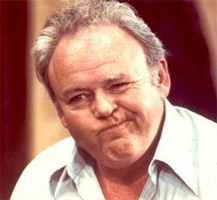 I attended a majority white high school in the late '70s and since that time my life has been one cross-cultural bowl of spaghetti. It tastes good but is really messy, sometimes sauce all over your shirt.
I attended a majority white high school in the late '70s and since that time my life has been one cross-cultural bowl of spaghetti. It tastes good but is really messy, sometimes sauce all over your shirt.
My first encounter with white folks was not a good one -- full of fear and uncertainty -- because I could only go by what I had heard from older adults or seen on television. Archie Bunker and Fred Sanford were the references I could draw on mostly. I went into my high school situation full of stereotypes, you know, like white people can't jump, and the all time favorite: White people have no rhythm and can't dance. What happens when you meet a person that fits the stereotypes? When Fred Sanford is right? When you meet the white person that cannot dance?
The problem with stereotypes is that they are generalities used as descriptors of categories of people. When these generalities are used as descriptors outside of relationship -- and sometimes within -- they form our opinions about groups of people that may or may not be true about individuals within that demographic (e.g., white people have no rhythm.) This leads to relational breakdown and causes a lot of pain (e.g, all Asians know karate.)
I met a white man who could not dance or play basketball, and it solidified what I thought I knew of white people. Oh yeah, and I was poor and from the city -- weren't all black people? Our relationships will go nowhere if we let our misinformed stereotypes dictate them.
We now live in a world where stereotypes are less and less true, but we still have Archie Bunker and Fred Sanford type of relationships. (Google them if you're too young to know the reference.) The city is for poor black people, restaurants or dry cleaners for Chinese, 7-Eleven for Indians, construction for Mexicans, reservations for Native Americans, and though white people can't dance, they are all rich. These all sound absurd and yet we live as though they are true for everyone. Our stereotypes are falling every day -- will we be able to relate outside of them?
The possibilities are different today as we watch a person of color lead our nation. We see corporations, Supreme Court justices, and writers of color emerging past the stereotypes. Can we relate differently? Can we see each other as equals, as human people with various cultural differences that make us beautiful? Our stereotypes have fallen, and I hope we can get up.
 Leroy Barber is president of Mission Year, a national urban initiative introducing 18- to 29-year-olds to missional and communal living in city centers for one year of their lives. He is also the pastor of Community Fellowships Church in Atlanta, Georgia, and author of New Neighbor.
Leroy Barber is president of Mission Year, a national urban initiative introducing 18- to 29-year-olds to missional and communal living in city centers for one year of their lives. He is also the pastor of Community Fellowships Church in Atlanta, Georgia, and author of New Neighbor.
Got something to say about what you're reading? We value your feedback!